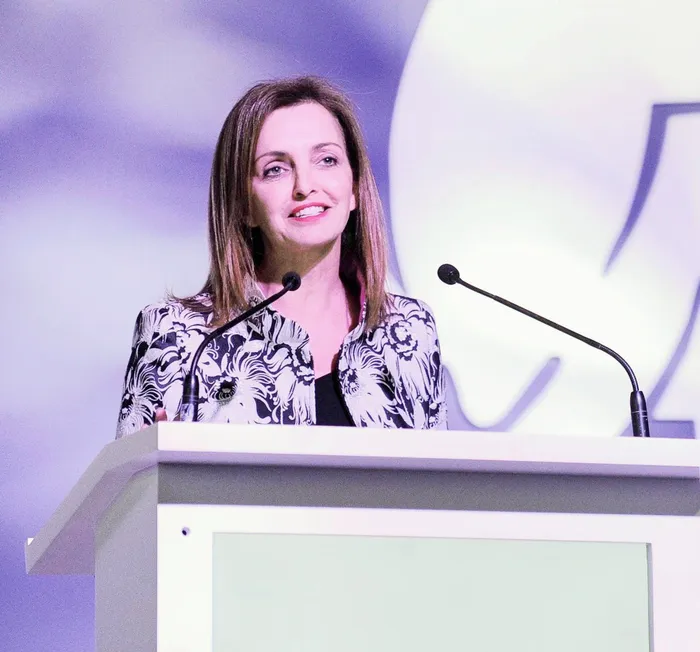
JSE CEO Dr Leila Fourie said stocks on the JSE were previously undervalued, and in the past six months to June 30 a weaker dollar and stronger rand have made JSE equity investments attractive for foreign investors again
Image: Supplied
The Johannesburg Stock Exchange (JSE) Limited has unveiled strong financial results for the six months to June 30, showcasing a remarkable performance that has positioned it ahead of many developed economies.
JSE CEO Dr Leila Fourie, in an interview with Business Report, attributed this success to a blend of heightened market activity and effective execution across core business lines.
For the period under review, the JSE reported a 13.2% increase in taxed profit, signaling the resilience of its operational model. Revenue surged to R1.65 billion, marking an 11.8% increase, while the headline earnings per share (HEPS) rose by an impressive 13.4% to 587 cents. This upward trajectory as also reflected by the three new equity listings in the first half, with expectations for an additional seven listings in the second half.
"As of the close of business on Monday, the JSE All Share Index recorded a remarkable 21.8% increase this year," Dr Fourie explained. This contrasts sharply with the MSCI world index and MSCI Emerging Market Index, which rose by 9.8% and 14% respectively.
Notably, the JSE's share price has climbed nearly 50% since the establishment of the Government of National Unity last year, demonstrating investors' renewed confidence in the market operator.
The momentum hasn't slowed, with July witnessing an average daily market volume increase of 30%, contrary to traditional expectations for the quieter summer holiday period in Europe. The initial days of August have also shown promising activity. Dr Fourie assured stakeholders that the JSE's infrastructure is equipped to handle periods of "hyper-volatility."
During the interim period, total operating income rose 11.4% to R1.7 billion, although other income took a significant hit, plummeting 54.7% to R12 million. Despite this setback, the total income increased by 10.3%, reflecting the overall positive business climate. Total expenditures also climbed by 7.5% to R1.09bn.
Revenue gains were strong in the Capital Markets, Post-Trade, and Information Services (JIS) segments, underscoring the foundational strength of the JSE's diverse revenue base. Capital Markets reported a 16% revenue increase, while Post-Trade Services and JIS saw growths of 17% and 5% respectively. Notably, equity trading revenue within Capital Markets soared by 28% to R272m, with clearing and settlement revenue from Post-Trade Services up 33% at R261m.
JIS revenue fell by 11%, impacted by lower interest rates and margin adjustments from the previous year. Total operating expenditure rose partly due to increased trade-related costs, with 1.56% of the increment attributed to heightened trading activity. The company also invested R27m in capital expenditure aimed at protecting its core operations while advancing new business lines.
The JSE’s strong cash position at R2.5bn as of June 30 further reinforces its operational stability. Of this, R1.31bn constitutes regulatory capital and investor protection funds.
As part of its strategic initiatives in the first half, the JSE launched the JSE Fix Hub, enhanced its Colo 2.0 secondary solution, and implemented bond repurchase agreements. Moreover, the JIS asset reunification project gained traction, with nearly 65 000 individuals checking their dividend status, of whom approximately 8 200 had dividends due.
Dr Fourie said some R4.5bn in dividends was unclaimed, and they were also pursuing the possibilty of joining their infrastructure so that potential claimants could access the over R80bn in unclaimed insurance benefits.
The JSE has also embraced innovation with the launch of the public access subscription for the JSE Trade Explorer, enabling investors to access unique exchange analytics. The JSE Market Data Connect infrastructure was modernised.
"The JSE is well-positioned to advance its strategic agenda in the second half of the year,” concluded Dr Fourie. Backed by a robust balance sheet and a disciplined investment approach, the future appears promising for the exchange.
Visit:www.businessreport.co.za